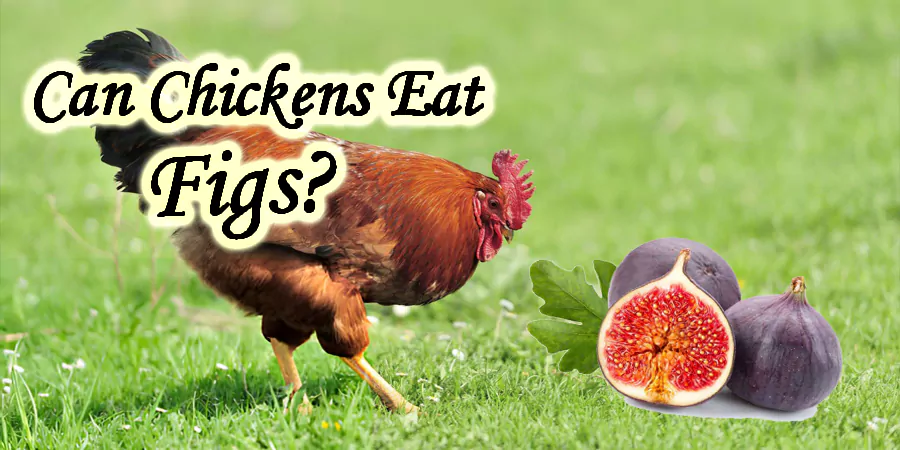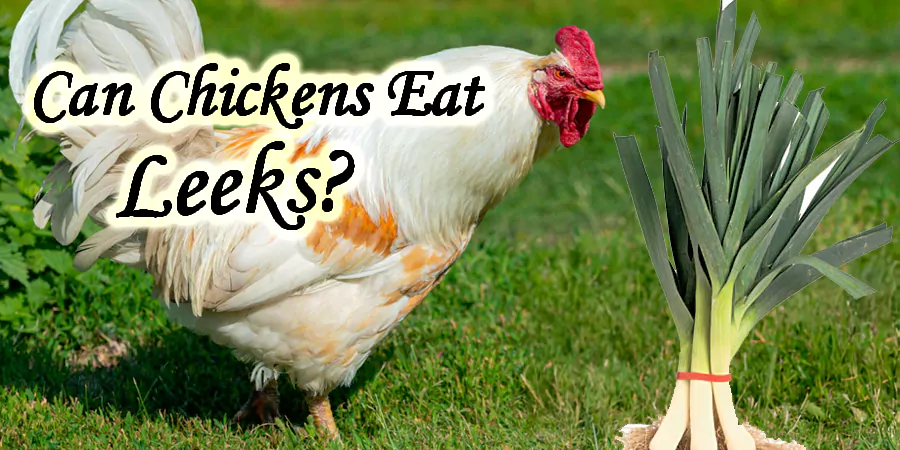Can Chickens Eat Figs? Unveiling the Truth
Published: 14 Jul 2024
Being cautious chicken owners we always face this query: can chickens munch on figs? Figs are sweet and tasty fruit for chickens. Generally, they can feast on figs but a clear understanding of the potential hazards is crucial for the safety of our flock. To give our fellow poultry keepers a clear and decisive solution, we will delve into the minute details related to figs and chickens. So, let’s figure out the key concerns and their solution with us.

Can Chickens Eat Figs? Unveiling the Truth
Are Figs Good for Chickens?
It depends on the preventive measures taken before serving figs to chickens. If you have an in-depth understanding of the pros and cons of figs for chickens then it is a good food for chickens. Figs offer a good nutritional value for chickens. The sweet content of figs may cause problems for chickens if served in excessive amounts. So, limited use of figs for your backyard chickens is good and healthy.
Nutritional Profile of Figs
Figs are nutrient-rich food for chickens. Chickens need a well-balanced diet for their optimal growth and production. Therefore, we are providing you with an overview of the key nutrients available in figs. Figs have a high value of calories. They are packed with carbohydrates in the form of glucose and fructose. It contains a decent value of fiber which helps in the digestive mechanism of chickens.
Figs are rich in nutrients like minerals and vitamins. It is filled with Vitamin A, C, and K. Potassium, magnesium, and calcium are available in good quantities which are good for chicken’s health. Phenols and flavonoids are helpful antioxidants that prevent cell damage in chickens. So, considering these nutrients we are excited to serve figs to our flock as an occasional part of their regular diet.
How to Prepare Figs for Chickens?
To make sure that figs are safe and healthy for our flock, the preparation process plays a major role. Here are some key points to consider before serving figs to chickens.
- The selection of figs is very important. We suggest you choose fresh and properly ripe figs for your flock. Overripe or spoiled figs can be easily fermented and can be harmful to chickens.
- After selecting fresh and ripe figs, it is important to decontaminate them. There are chances of pesticide residues or dirt which can create digestive problems in chickens. Rinse the figs gently under running water.
- Now, fresh and cleaned figs are in front of you. The next step is to chop them into small pieces. The size of the pieces can vary according to the age or size of your flock. It prevents the choking hazard for chickens.
- After preparing the fresh, ripe, and chopped figs, now we have to use entertaining ways to feed them to our chickens. We will give you some helpful suggestions in our next segment.
- Mixing these chopped pieces of fig with other foods will help chicken owners attract their flock. It will add nutritional value to the routine diet of our flock. Use foods that are already loved by chickens.
- Serve figs as an occasional diet for your flock. The nutritional value of figs is not good enough to justify its use as a primary diet for chickens. Introduce it gradually and carefully observe the response from your flock.
How to Feed Chicken Figs?
Now we have understood the preparation process of figs for chickens. The next step is to feed the figs to chickens in a way that is healthy and entertaining for our flock. In this case, we have some simple yet luring suggestions.
- You can scatter these chopped figs around the coop. Chickens will love to peck these figs in their run. It will promote a foraging tendency in the flock.
- Make a hanging treat for chickens. Use a mesh or net and tie the chopped figs with them. Hang them on the coop with a solid branch or hook.
- Make a mixed trail of figs and other formulated foods. Use figs in low volume to avoid nutritional imbalance. Every bite should have a bit of fig in it.
- In the summer season, frozen treats containing figs will be delightful for chickens. Place these frozen cubes of figs in the garden and let them peck.
- You can arrange a physical activity in chickens to hide these small pieces of figs in the garden. Let them search for their food and enjoy the activity.
Can Hens Eat Figs? Effects on Egg Production
Yes, egg-laying hens can enjoy the sweet figs in moderation. Figs provide essential nutrient that improves the egg production and quality. Calcium is a major mineral that impacts the eggshell quality. Figs contain sugar content. Excessive volume of sugar can have negative impacts on egg production. So, serve fig flesh to hens sparingly as their occasional diet.
Can Baby Chickens Eat Figs?
Yes, chicks can have figs under vigilant monitoring. Baby chickens have immature digestive mechanisms. We advise you to only serve a commercially formulated starter diet for baby chickens of less than eight weeks. At the age of two months, start adding other diets into their routine starter plan. Take some extra care of cleaning the figs and serving them in chopped form to baby chickens. Their response is vital.
Can You Feed Figs to Chickens Every Day?
No, daily use of figs is not recommended for chickens. We have suggested its use as an occasional diet. You should focus on the primary source of nutrition for chickens. Figs are nutrient-rich but no such diet can fulfill the dietary needs of the flock. Figs are good for diversifying the chicken’s diet plans. So, never think of offering figs to chickens daily.
What Type of Figs Can Chickens Eat?
There are some commonly known types of figs. It is crucial to understand their traits and then decide about their use for chickens.
Can Chickens Eat Common Figs?
Yes, chickens can munch on common figs in moderation. The scientific name of common figs is Ficus Carica. They should not be unripe or overripe. Properly ripe common figs are safe for chickens. Wash them and slice them into small pieces to avoid choking problems for chickens. Common figs are full of nutrients that are supportive of the overall health of chickens. This type of fig contains a high sugar level which is not good in excessive amounts. So, serve common figs in small amounts to your chickens.
Can Chickens Eat Smyrna Figs?
Yes, chickens can have Smyrna figs in moderation with some consideration. Smyrna figs are delicious and nutrient-rich food for chickens. Always choose fresh and ripe Smyrna figs for your flock to prevent health issues. Like the common figs, this type of fig also contains a good amount of nutrients and fiber. Carefully prepare the Smyrna figs and use an engaging way to serve them to chickens. It includes a high sugar level. Therefore serve it sparingly.
Can Chickens Eat San Pedro Figs?
No, San Pedro figs are not recommended for chickens. San Pedro figs are different from the first two types of figs mentioned above. It has large and glossy leaves with small figs as compared to other types of figs. There is a potential hazard of toxicity with Ficus Macrophylla (San Pedro Figs). Chicken’s health safety is our priority. So, we will suggest not serving San Pedro Figs to your flock.
In Which Form Do Chickens Eat Figs?
Figs are available in various forms, such as raw, cooked, and dried. Each form has its specific properties and nutritional value.
Can Chickens Eat Raw Figs?
Yes, chickens truly enjoy pecking at the raw figs. You must ensure that the figs are properly ripe. Overripe or spoiled figs can cause digestive issues in the flock. Wash the selected raw figs with water and cut them into small pieces. Raw figs contain nutrients (vitamins, minerals, and fiber) that are good for the overall growth of chickens. You can serve figs occasionally to prevent diet imbalance. Chickens must have easy access to water.
Can Chickens Eat Cooked Figs?
Yes, chickens can eat cooked figs. It is not essential to serve cooked figs because chickens love them in raw form. The cooking of figs can reduce their nutritional value, especially affecting the vitamin C. Additionally, adding artificial flavors or seasonings during the cooking process is not healthy for chickens. It is observed that cooking figs will alter their texture and taste which is not loved by the flock. So, we suggest you prefer raw figs for your flock.
Can Chickens Eat Dried Figs?
Yes, chickens can munch on dried figs with some additional care. Dried figs have less water content and more concentrated sugar as compared to raw figs. Excessive amounts of sugar will have negative impacts on chicken’s health. There is a potential risk of dehydration in the flock with dried figs. So, serve dried figs in limited quantities, chop them into small pieces, and ensure easy access to fresh water.
Can Chickens Eat Unripe Figs?
No, chickens should not eat unripe figs because of various reasons. Unripe figs are difficult to digest for chickens. Additionally, they contain toxic compounds in the form of latex sap. It can cause stomachaches and diarrhea in your flock. The flavor of unripe fruit is also annoying for chickens. So, we suggest to avoid offering unripe figs to your flock.
Which Parts of Figs Can Chickens Eat?
Can Chickens Eat Fig Tree Leaves?
No, chickens can’t eat fig tree leaves because they contain toxic compounds. This milky latex sap is harmful to animals including chickens. Fig tree leaves are not delectable for chickens. Chickens might face choking issues and digestive upset by consuming fig leaves. So, we suggest you avoid feeding fig tree leaves to your clucking champions.
Can Chickens Eat Fig Seeds?
Yes, chickens can eat fig seeds sparingly in moderation. Fig seeds are small in size and pose no potential risk of choking to chickens. Fig seeds are helpful in the provision of varied diets to chickens. You can mix them with other fruits or grains to make an appealing treat for the flock. So, there is no need to remove seeds from figs. They provide some healthy nutrients to chickens.
Can Chickens Eat Fig Skin?
Yes, chickens can have fig skin with some caution. Unlike other fruits, fig skin is not hard. It can be easily digested by chickens. The cleaning process of fig skin is very important. You have to ensure fresh and ripe figs. Thoroughly wash them under running water to remove dirt and pesticide residues from fig skin. Serve them in moderation to prevent nutrient imbalance.
Can Chickens Eat Fig Flesh?
Yes, chickens can eat fig flesh and enjoy its soft texture with a sweet flavor. It is the most nutritional part of figs. It contains vitamins (A, B, and K), minerals (potassium, phosphorus, magnesium, and calcium), fiber, and antioxidants. Fig flesh is easy to digest food for chickens. Serve it after proper preparation. Always ensure its volume to a minimum level. Observe the response of your flock and adjust its portion accordingly.
Can Chickens Eat Fig Stems?
No, fig stems are not recommended for chickens. Like fig leaves, their stems also contain toxic content. `It can harm your chicken’s healthy growth. The stems of fig plants are hard and difficult to consume for backyard animals. So, we suggest you keep your flock away from fig plants, leaves, and stems. Instead offer them more nutritious foods.
Benefits of Figs for Our Flock
After a detailed analysis of figs, we are providing you with a list of the benefits of figs for chickens. These advantages of figs will help you in making of decision:
|
Potential Risks to Consider
It is crucial to identify the risks and mitigate their impacts on chicken’s health. Here is a list of some common hazards you might face while serving figs to the flock:
|
Alternatives to Figs for Chickens
Fig is a sweet and nutrient-rich fruit and chickens love to peck at its flesh. If you are looking for more safe and healthy food ideas for your flock then consider these dietary options:
- Berries: Berries are a sweet, safe, and nutritious dietary option for chickens. Chickens love to have them in their treat. Raspberries, blackberries, strawberries, and cranberries are good for chickens.
- Melons: Melons are best for chickens during the summer season. Watermelon, cantaloupe, and dragon fruit are famous among chicken owners. Besides water content, they are rich in vitamins, minerals, and antioxidants.
- Pumpkin and Squash: Squash and pumpkin are rich in vitamins A and C. They provide healthy fiber which supports digestion in chickens. They offer a good amount of water content which prevents dehydration in chickens.
- Pistachios and Walnuts: If you like nutty texture with loads of nutrients then walnuts and pistachios are highly recommended. Serve them after mixing them with a routine diet. They are also supplementary foods for chickens.
- Acorns: Acorns are a good source of carbohydrates, protein, fiber, vitamins, and minerals. The preparation of Acorns is very crucial. Only serve leached acorns to your chickens in cooked form.
- Salmon: If your priority is to offer an omega-3 fatty acid diet to your flock then salmon fish is the best option. You should serve only boneless small pieces of salmon to your flock. Salmon provides some health benefits.
Conclusion
We have concluded that chickens can eat figs with caution. Figs are safe and healthy for chickens in limited quantities. Fig leaves and stems are not recommended because of toxic compounds. We have understood that the preparation process is very vital.
Select fresh and fully ripe figs for your flock. Unripe and overripe figs are unhealthy for the flock. They can create digestive problems for chickens. To prevent choking risk chop figs into small pieces according to the age and size of your flock. Figs have high sugar content which can hurt egg production. So, serve figs in small quantities.
FREQUENTLY ASKED QUESTION:
Can Chickens Eat Old Figs?
No, we are not in favor of serving old figs to the flock. There are chances of fermentation or spoilage with old figs. Both of these conditions are harmful to chickens. Their texture and flavor will also alter and be unpleasing for chickens. So, we always advise serving fresh, decontaminated, and ripe figs to the flock.
Can Chickens Eat Fig Bars?
Yes, chickens can have fig bars in moderation. The fig bars should be plain or unseasoned. Some commercial fig bars contain artificial flavors and additives which are unhealthy for chickens. So, carefully check for the ingredients first. Fig bars have fewer nutrients as compared to fresh figs which is not favorable for our backyard birds. So, we suggest you prefer fresh figs over fig bars.
Can Chickens Eat Whole Figs?
No, you should not serve whole figs to the flock. It is not a wise move to make things difficult for our flock. There is a high probability of dietary tract blockage with whole figs. Therefore, we suggest to serve chopped figs to your flock. It will be easier to digest small pieces of figs for our backyard clucking friends.
Can Chickens Eat Fig Newtons?
It depends. If fresh figs are available then why opt for commercial snacks? Fig newton contains additives that are not suggested for chickens. The artificial sweeteners are added during the preparation process of fig newton. If you are going to offer fig newton to your flock then check for their ingredients and ensure moderation.

- Be Respectful
- Stay Relevant
- Stay Positive
- True Feedback
- Encourage Discussion
- Avoid Spamming
- No Fake News
- Don't Copy-Paste
- No Personal Attacks

- Be Respectful
- Stay Relevant
- Stay Positive
- True Feedback
- Encourage Discussion
- Avoid Spamming
- No Fake News
- Don't Copy-Paste
- No Personal Attacks


